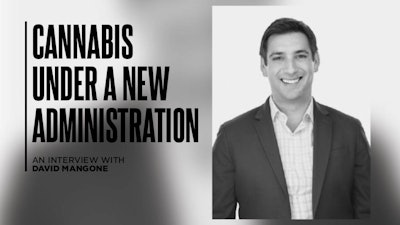
President-elect Donald J. Trump’s recent campaign positions on adult-use cannabis legalization present a stark contrast from his first term in the Oval Office. And what a Trump administration and Republican-controlled Congress will mean for the still federally illegal U.S. cannabis industry is the question on the minds of many business owners, patients and advocates around the country, especially as the fate of cannabis rescheduling still hangs in the balance, and after the SAFER Banking Act finally saw some movement in the U.S. Senate.
During Trump’s first term, he appointed a staunch cannabis prohibitionist, Jeff Sessions, as U.S. attorney general. Sessions’ anti-cannabis remarks while serving as a U.S. senator became well-known throughout the fledgling cannabis industry. “We need grown-ups in charge in Washington who say that marijuana is not the kind of thing that ought to be legalized. … This drug is dangerous,” Sessions said during a 2016 Caucus on International Narcotics Control hearing, adding that “Good people do not smoke marijuana.”
And when Sessions became Trump’s attorney general, he rescinded the Cole Memo, written by former President Barack Obama’s Deputy Attorney General James M. Cole, directing all U.S. attorneys to essentially leave state-legal cannabis businesses alone, despite federal law.
Prior to his 2016 presidential campaign, Trump himself voiced support for medical cannabis but opposition to adult-use cannabis legalization. “At the Conservative Political Action Conference in March 2015, Trump said he was leery of legalizing marijuana for recreational use, but ‘medical marijuana is another thing,’” Reason reported. “He said he was ‘100 percent’ in favor of medical use.”
In contrast to that, during his recent campaign in September, Trump indicated he backed the Biden administration’s push for the Drug Enforcement Administration (DEA) to reclassify cannabis as a Schedule III drug under the Controlled Substance Act (CSA).
Trump also confirmed that he would be voting in support of Florida’s Amendment 3—that would have legalized adult-use cannabis in the Sunshine State—in the November election and said he plans to work with Congress to provide state-licensed cannabis businesses access to traditional banking services if elected to a second term as president, as Cannabis Business Times reported.
RELATED: Florida’s Cannabis Legalization Measure Fails Despite Majority Support
The president-elect’s recent cabinet appointments also suggest a pivot from his position on cannabis during his first presidential term.
Trump’s initial pick for attorney general this time around—former U.S. Rep. Matt Gaetz, R-Fla.—is a polar opposite of Sessions in respect to cannabis. Gaetz has a legislative record that has historically been pro-cannabis, as Cannabis Business Times reported. He has supported federal cannabis legalization, safe banking and loosening restrictions for cannabis research.
However, Gaetz removed himself from consideration for heading the Department of Justice (DOJ) on Nov. 21. That same day, Trump named Pam Bondi, former Florida attorney general, to replace Gaetz as his choice for U.S. attorney general. In Florida, Bondi followed former Gov. Rick Scott’s directive to support the Legislature’s attempted ban on smokable medical cannabis.
How Bondi’s future handling of federal cannabis reform under Trump is less clear than that of Gaetz.
Trump also appointed Robert F. Kennedy Jr.—who advocated for cannabis legalization as part of his presidential campaign—as the Department of Health and Human Services (HHS) Secretary.
“What I’ve advocated is that we should legalize marijuana,” Kennedy said in a campaign ad that was reported on by NewsNation. “We should have a federal tax on marijuana that is designated specifically for drug treatment and rehabilitation, and I want to build, as part of my presidency, a series of renewal centers of detoxification, essentially, centers around this country to treat the rise in mental illness and PTSD and drug addiction that is debilitating our children.”
Additionally, Kennedy voiced support for cannabis banking reform.
What do the incoming president’s campaign remarks and recent appointments mean for the cannabis industry? To take a deeper dive, CBT spoke with David Mangone, J.D., vice president of federal cannabis advocacy firm Liaison Group and policy director for National Cannabis Roundtable, an alliance of cannabis companies and related businesses working to push cannabis reform forward.
Mangone has worked for nearly 10 years to influence federal and state cannabis policy through authoring legislation and advising lawmakers at all levels of government. He previously served as the director of government affairs and counsel for Americans for Safe Access, the nation’s largest nonprofit representing medical cannabis patients, as a legislative fellow for a senior Democratic member of Congress on the House Committee on Ways and Means, and as a private practice attorney. Mangone has a unique insight into cannabis policy in the context of political affairs, the legislative process, administrative law, and executive actions.
Here’s what Mangone shared during a conversation with CBT about what the industry can expect moving forward:
Noelle Skodzinski: What do you think a Trump presidency means for the cannabis space in general?
David Mangone: I want to start by pointing out that what happened with the first term for President Trump, I think, is going to be very different than what's going to happen in the second term for cannabis.
In September—and of course, this was on the campaign trail—you did have President-elect Trump support legalization, Florida's Amendment 3, safe banking, as well as letting states set their own policies. That's kind of consistent with some remarks that President Trump made during his first term supporting then-Sen. Cory Gardner's STATES Act.
That, of course, is in pretty significant contrast to his appointment of Attorney General Jeff Sessions. Jeff Sessions was one of the biggest prohibitionists in the U.S. Senate, made lots of remarks … about both the cannabis consumer, and they were usually pretty derogatory, and the cannabis industry.
You look at the current slate of names that President Trump has put forward for his forthcoming cabinet. There are a lot of names in that list who have been very outspoken in their support for both legalization and for cannabis. Time will tell if all those individuals will get through a Senate confirmation process.
But at least at this point, you are looking at a very pro-cannabis cabinet that is starting to be assembled.
Skodzinski: You mentioned Jeff Sessions. After Sessions rescinded the Cole Memo and based on Trump's past remarks, based on what you said, do you have confidence his second term will be different based on his more recent campaign remarks and these appointments?
Mangone: Yeah. And, when you look particularly at the names who have been thrown out for both the Department of Health and Human Services, with Robert F Kennedy Jr., as well as Matt Gaetz for the Department of Justice [who has since withdrawn himself from consideration], they have both, at least on cannabis, been very in favor of reform. Trump also has many people in his orbit this term who are supportive of cannabis reform that will not be in cabinet positions but will have regular contact with the President, like Elon Musk.
But even in Trump’s first term, with the rescission of the Cole Memo, we didn't see all that much actual enforcement after that rescission. I think it would have been within the purview of Attorney General Sessions to really crack down on the industry after rescinding that memo. But we didn't see that.
And even since that first Trump term, we have had several states add medical programs, and we’ve had a handful add recreational or adult-use programs. The landscape itself is a bit different than what it was in 2017 through 2019 where there was a Republican trifecta where Attorney General Sessions was at the Justice Department.
“This has gotten to the point where Republicans and Democrats acknowledge that the status quo continues to be untenable.”
And despite the underperformance by some of these ballot initiatives on election night, you still in Florida had the majority of voters at 56% support legalizing adult use cannabis. You had Nebraska move forward supporting medical cannabis.
… And having the leaders of the party, the president included, supporting reform, I think that will make some members of the party maybe reconsider their opposition.
Again, this is all very hypothetical. What's said on the campaign trail doesn't always necessarily translate into activity in terms of policy. I think a good example is when you look at some of the promises that President Biden made on the campaign trail. While he initiated the rescheduling process, he also promised that no one should be in jail for simple possession. That was kind of a false promise because there weren't that many federal offenders who had a simple possession charge as it was. And there are still plenty of individuals who are incarcerated for cannabis offenses at the federal level and, of course, at the state level.
But to the point that you look at the people who are coalescing around President Trump as potential nominees, he is likely hearing a lot more in favor of cannabis support rather than against.
Skodzinski: You mentioned Robert F, Kennedy, Jr., whom Trump nominated as the Department of Health and Human Services (HSS) Secretary. Many in the cannabis industry have been concerned that the cannabis rescheduling hearings got pushed until after the election and then to early 2025. Kennedy advocated for legalization as part of his presidential campaign. Do you think his appointment, if confirmed, could impact rescheduling in what could be the tail end of the rescheduling process?
RELATED: Cannabis Rescheduling Judge Authorizes Prohibitionist Group to Respond to Collusion Claims
Mangone: Where I see his influence is public pressure and support of the move to reschedule or to remove cannabis from the CSA. At this point in the process, HHS has already given their recommendation on rescheduling. It is now up to this administrative law judge to decide and weigh the evidence that's presented by experts at this hearing as well as the existing record, the public comments and the report from HHS.
The role of an HHS secretary in the current rescheduling process is a little bit limited. I do think if Kennedy comes out and is very vocally supportive of the process or taking it further that probably impacts how an ALJ judge makes the decision.
But unless this process were to really start over, the role of HHS is much more of a mouthpiece of support than actually making a policy decision.
There certainly is the possibility that this process gets scrapped by a Trump administration, or that these agencies are directed to either start the process over or reconsider the conclusions that have been made.
And if that is the directive, then yes, HHS will have a much bigger policy role, and Robert F. Kennedy Jr. will also have a much bigger role in directing that policy.
[If that happens], I think a cabinet secretary from a Democratic administration and a cabinet secretary from a Republican administration coming to the same conclusion that cannabis does not belong in Schedule I is probably impactful and something that the ALJ judge takes into consideration.
Skodzinski: Let’s talk about the SAFER Banking Act. Trump said in September that, as president, he would work with Congress to pass common-sense cannabis laws, including safe banking for businesses. SAFE and SAFER failed to see action in the Senate until September 2023. More recently, SAFER was noted as a priority on Senate Majority Leader Chuck Schumer's to-do list. With a Republican-controlled Senate and no floor vote to date, do you think given what Trump said in support of safe banking, it's a realistic expectation that we might see movement on SAFER?
Mangone: I want to first talk about the remainder of this Congress, the lame-duck session. Both Sen. Schumer and Sen. Steve Daines, who's the Republican lead on SAFE banking, have expressed their interest in trying to continue to move this bill in the remaining legislative days of this Congress.
When we're doing this interview, there's only 13 legislative days left in this Congress. That is obviously a very tight window. But in those 13 legislative days, there has been discussion of doing a continuing resolution on the budget.
There's also been discussion of finalizing the National Defense Authorization Act. I highlight that as a potential vehicle for SAFE banking because that was attempted by the House last time that we were in this the same type of timeline. I think that the continuing resolution or NDAA are the most likely bill that this would get attached to.
That being said, with going from a divided government to having a Republican trifecta, I don't know if there is a lot of interest to move, frankly, any legislation that requires cooperation with Democrats beyond what is absolutely necessary in the next month as we look toward the winter holidays. …
But you have the bill’s leading sponsors as well as a number of people who've been involved in the negotiations still very supportive of moving it during lame duck, so we will see how the next weeks unfold.
As far as the 119th Congress that convenes in January, I don't see SAFE banking rising to the level of priority as some other issues that the Republican senators campaigned on coming up in the first 100 days of the new administration, whether it be the economy or immigration or other issues. And, of course, looking to confirm the cabinet and probably some new federal judges as well.
But there's a possibility it gets done later in Congress. You still have strong allies in the Republican Party who are coming back to support this bill.
[Rep.] Dave Joyce [R-Ohio, and a co-sponsor of the bill] won his seat fairly handily. He has been the Republican lead in the House. [Sen.] Steve Daines—the lead Republican on this bill—as the National Republican Senatorial Committee chair had a very successful night on election night. So, he will have some good political capital.
Skodzinski: Let’s talk about newly elected Senate Majority Leader John Thune, an adversary to cannabis reform, including legalization, rescheduling and banking. Do you think his position diminishes the industry's hope of passing pro-cannabis legislation, particularly SAFER, in the upcoming Congress?
Mangone: When we look at Sen. Thune, it's important to compare him to his predecessors. We did not have much success moving cannabis reform with Leader McConnell when the Republicans were previously in charge.
Again, we have a few weeks left to see if Leader Schumer will deliver on some of his promises and intentions to move cannabis reform forward.
But I'm very much of the mindset that fresh eyes and fresh perspective may be helpful to this industry moving forward.
I completely acknowledge that Thune has not been supportive of the issue in the past, but there has also been a frustration with cannabis banking and some other issues that first we were told we had to go through regular order. We went through regular order and had the Senate banking markup and GOP members have the opportunity to weigh in on amendments, but many were ultimately blocked from being added to the underlying bill text.
What I'm curious to see is how Thune governs the Senate generally in terms of floor amendments, in terms of committee procedures and how he considers some of the pieces of legislation that both Leader McConnell and Leader Schumer were reluctant to allow to go forward.
And then there's been a lot of discussion, of course, about recess appointments. How the Senate navigates under a new leadership, I think, is more important than his actual policy positions. Thune strikes me as the type of leader who will get input from his membership as he brings things to the floor.
Skodzinski: What else is important to address with all these changes and pending changes?
Mangone: Cannabis continues not to go away. Although there were ballot initiatives in the Dakotas and Florida that failed, you're still looking at a map where cannabis is popular in both red states and blue states, particularly medical cannabis.
RELATED: The Landscape of Legal Cannabis in the U.S.
This has gotten to the point where Republicans and Democrats acknowledge that the status quo continues to be untenable. What that solution is in the new Congress, it's probably something that is not as expansive as the MORE Act or the Cannabis Administration and Opportunity Act. We're probably more in the realm of letting states decide their own policies, sort of a harken back to the Cory Gardner STATES Act and some of the subsequent iterations that have been introduced.
I think what a wild card will be is if indeed President Trump follows through on his campaign promises and supports full legalization—what does that look like from an administrative side and how many votes can he bring along in Congress if that is his proposal?
I do think there is some bipartisan comfort with a hands-off STATES Act-type approach. It should be interesting to see if this is a tenant of policy in the Trump administration that they want to pursue and if he can bring some of the more reluctant members along with him.
Skodzinski: Does the National Cannabis Roundtable have things that it's working on to ramp up for the upcoming administration change?
Mangone: We were on Capitol Hill this Wednesday continuing to push for SAFE banking, particularly in the lame duck. And there continues to be bipartisan interest in adding SAFE/SAFER to a year-end package, which is good news. That is our short-term goal, seeing if we can get this bill done this Congress.
And then as we look to the next session, it is exploring what type of reform can get us the votes we need both in the Senate and the House. In the new Congress, it's really determining what's realistic in terms of cannabis reform. …
I think square one, though, our priority is just making sure that the state programs that currently exist continue to be protected.
Skodzinski: Is there anything industry constituents can be doing to help this cause?
Mangone: Yeah—if it's been more than two weeks since you've called your member of Congress, it's time to pick up the phone, time to ask for what you want for your business.
There are thousands of issues that come into these offices every day. So, we must make sure that we stay both top of mind and relevant to these offices, and any area where we see a chance to move something forward, we should be seizing that chance.
There shouldn't be any change in outreach from the industry with a change in Congress. In fact, there probably should be more. We have probably more education to do on the Republican side about what the industry looks like and employment numbers and revenue figures.
It is just continuing to be present and vocal about this issue and this industry.
CBT Editor Tony Lange contributed to this feature.






















